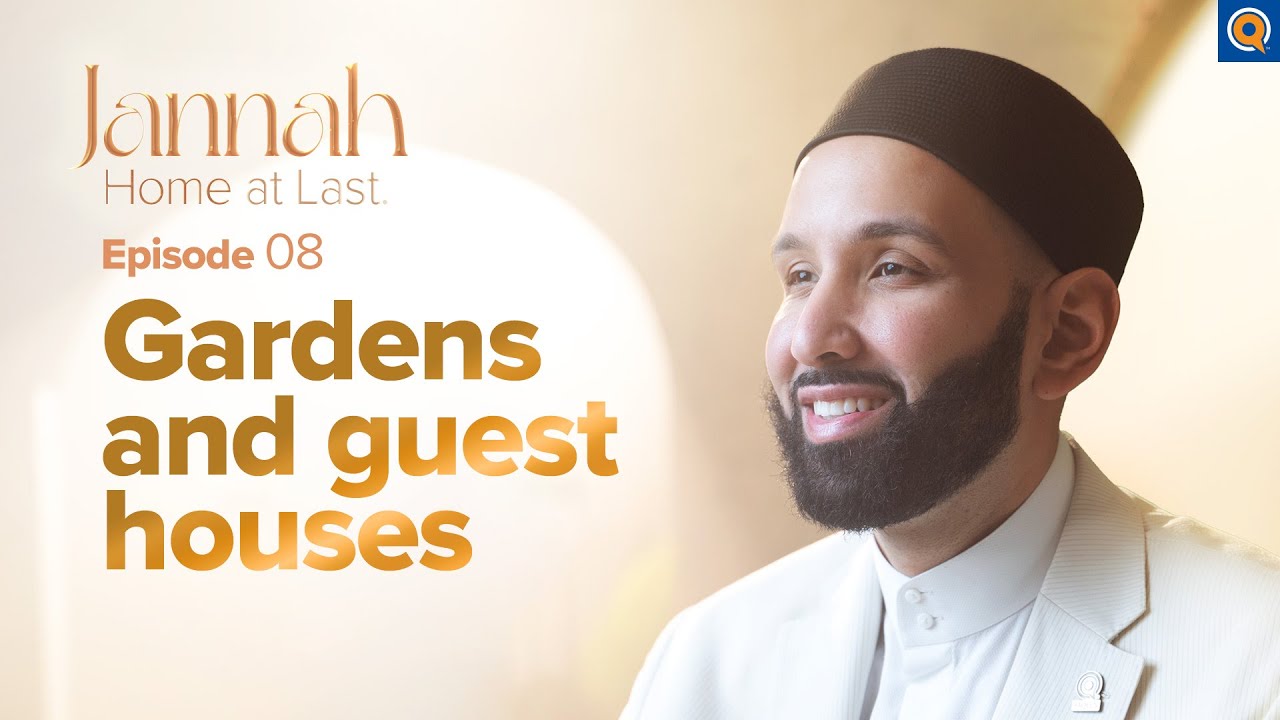10 Deeds That Build Houses in Jannah | Ep. 6 | #JannahSeries with Dr. Omar Suleiman
Summary
TLDRThis transcript highlights the immense rewards associated with acts of worship and good character that lead to homes in Jannah (Paradise). It discusses ten deeds that can result in palaces in Jannah, emphasizing prayers, charity, patience, and excellent character. The Prophet Muhammad (PBUH) shared that building a mosque, praying extra rak'ahs, reciting Surah Al-Ikhlas, and making supplications before sleep can all earn homes in Jannah. Furthermore, cultivating gratitude, fasting, night prayers, and excelling in character help believers secure elevated dwellings in the hereafter.
Takeaways
- 🏠 The homes in Jannah (Paradise) are earned through specific good deeds, and they represent incredible rewards for acts of worship and patience.
- 🕌 Building a masjid for Allah, even contributing a small amount, results in Allah building a home in Paradise for the contributor.
- 🙏 Praying 12 extra rak'ahs (optional units of prayer) daily, apart from obligatory prayers, guarantees a home in Paradise.
- 📜 Reciting 'Qul HuwaAllahu Ahad' (Surah Ikhlas) 10 times results in Allah building a palace in Jannah.
- 💤 Performing wudhu (ablution) before sleep, reciting a specific dua, and sleeping on the right side earns a home in Jannah.
- 🛒 Reciting a specific dhikr (remembrance of Allah) when entering a marketplace can result in immense rewards, including a home in Paradise.
- 🍴 Feeding the poor, consistently fasting, and praying at night while others sleep are actions that build special dwellings in Jannah.
- 😌 Avoiding arguments, even when right, and abstaining from lying, even in jokes, results in a home in Paradise.
- 🌟 The highest reward in Jannah is for those who excel in their character, with the Prophet Muhammad (PBUH) guaranteeing a place in the highest part of Paradise.
- 🤝 Those who excel in character not only secure a beautiful home in Jannah but are promised to be close to the Prophet Muhammad (PBUH) in the hereafter.
Q & A
What is the first type of home mentioned in Jannah, and how is it built?
-The first type of home in Jannah is built with patience (sabr). Examples include homes built for Asiyah, Khadijah, and the 'ibadur-Rahman (servants of the Most Merciful). These homes are considered the best ones in Jannah.
What reward is associated with building a masjid for Allah?
-Whoever builds a masjid for Allah will have a home built for them in Paradise by Allah, even if the contribution is small. This reflects Allah's generosity in rewarding efforts to build places of worship.
How can one earn a home in Jannah through extra prayers?
-Praying 12 extra rak'ahs (sunnah prayers) a day, such as two before Fajr, four before Dhuhr, two after Dhuhr, two after Maghrib, and two after Isha, earns a home in Jannah. These prayers should ideally be prayed at home.
What is the significance of reciting Surah Al-Ikhlas (Qul HowaAllahu Ahad) 10 times?
-Reciting Surah Al-Ikhlas 10 times results in Allah building a palace in Jannah. This reward is tied to the sincerity expressed in the surah, which is an elaboration of the declaration of faith (La ilaha illa Allah).
What is the benefit of reciting the dua before sleeping as taught by the Prophet (PBUH)?
-Reciting the dua before sleeping, which includes entrusting oneself to Allah and affirming belief in the Qur'an and the Prophet (PBUH), results in either dying on the fitrah (natural disposition) or having a home built in Jannah.
What reward is mentioned for reciting a specific dua when entering the marketplace?
-Reciting a specific dua when entering the marketplace wipes away a million sins, grants a million good deeds, elevates the person by a million degrees, and results in a home being built in Paradise.
Who are the 'ibadur-Rahman, and why are they given high places in Jannah?
-'Ibadur-Rahman are the servants of the Most Merciful who exhibit exceptional worship and character. They are patient and bear the difficulties of life with faith in Allah. They are promised high dwellings in Jannah because of their patience and devotion.
What are the three practices of the 'ibadur-Rahman mentioned by the Prophet (PBUH) that lead to a palace in Jannah?
-The three practices are feeding the poor (a practice of gratitude), fasting consistently (a practice of patience), and praying at night while others sleep (a practice of excellence). These acts lead to a palace in Jannah.
What is the reward for avoiding arguments, even when one is right?
-The Prophet (PBUH) guarantees a home in the outskirts of Paradise for the one who avoids arguing even when they are right. This practice reflects forbearance (hilm).
What is the significance of excelling in character according to the Prophet (PBUH)?
-Excelling in character guarantees a home in the highest part of Paradise. The Prophet (PBUH) said that those who excel in character will be the closest to him in Jannah, making it one of the most valuable qualities a person can have.
Outlines

此内容仅限付费用户访问。 请升级后访问。
立即升级Mindmap

此内容仅限付费用户访问。 请升级后访问。
立即升级Keywords

此内容仅限付费用户访问。 请升级后访问。
立即升级Highlights

此内容仅限付费用户访问。 请升级后访问。
立即升级Transcripts

此内容仅限付费用户访问。 请升级后访问。
立即升级浏览更多相关视频

The Gardens of Jannah | Ep. 8 | #JannahSeries with Dr. Omar Suleiman

Your Home in Jannah | Ep. 5 | #JannahSeries with Dr. Omar Suleiman

Allah's Sign Just for You, A Special Gift Awaits!

#Part 1 - SABAR - KH. M. Agus Nafi’, S.Ag., M.Pd.I.

Shaykh Ahmed Ali- Hoorain/Hooris (The Women of Paradise/Jannah)

Amalan Bulan Romadon Yang Ringan Tapi Berpahala Besar,Ustadz Hanan Attaki,Ustadz Hanan Attaki
5.0 / 5 (0 votes)
